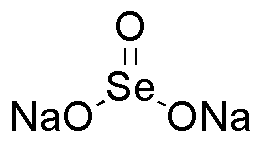Sodium selenite is widely utilized in research focused on:
- Nutritional Supplements: It serves as a source of selenium, an essential trace element that supports immune function and antioxidant activity. This makes it valuable in dietary supplements aimed at improving overall health.
- Pharmaceuticals: Sodium selenite is used in the development of certain medications, particularly those targeting cancer. Its ability to induce apoptosis in cancer cells is being explored in various therapeutic strategies.
- Analytical Chemistry: In laboratories, it is employed as a reagent for the determination of selenium levels in environmental samples, ensuring compliance with safety regulations and environmental standards.
- Agriculture: It is applied in agriculture as a micronutrient to enhance soil quality and crop yield, particularly in selenium-deficient areas, thus improving food security.
- Biotechnology: Sodium selenite is utilized in cell culture media to promote the growth of specific cell lines, aiding in research and development in the fields of genetics and molecular biology.
General Information
Properties
Safety and Regulations
Applications
Sodium selenite is widely utilized in research focused on:
- Nutritional Supplements: It serves as a source of selenium, an essential trace element that supports immune function and antioxidant activity. This makes it valuable in dietary supplements aimed at improving overall health.
- Pharmaceuticals: Sodium selenite is used in the development of certain medications, particularly those targeting cancer. Its ability to induce apoptosis in cancer cells is being explored in various therapeutic strategies.
- Analytical Chemistry: In laboratories, it is employed as a reagent for the determination of selenium levels in environmental samples, ensuring compliance with safety regulations and environmental standards.
- Agriculture: It is applied in agriculture as a micronutrient to enhance soil quality and crop yield, particularly in selenium-deficient areas, thus improving food security.
- Biotechnology: Sodium selenite is utilized in cell culture media to promote the growth of specific cell lines, aiding in research and development in the fields of genetics and molecular biology.
Documents
Safety Data Sheets (SDS)
The SDS provides comprehensive safety information on handling, storage, and disposal of the product.
Product Specification (PS)
The PS provides a comprehensive breakdown of the product’s properties, including chemical composition, physical state, purity, and storage requirements. It also details acceptable quality ranges and the product's intended applications.
Certificates of Analysis (COA)
Search for Certificates of Analysis (COA) by entering the products Lot Number. Lot and Batch Numbers can be found on a product’s label following the words ‘Lot’ or ‘Batch’.
Numéro de catalogue
Numéro de lot/série
Certificates Of Origin (COO)
This COO confirms the country where the product was manufactured, and also details the materials and components used in it and whether it is derived from natural, synthetic, or other specific sources. This certificate may be required for customs, trade, and regulatory compliance.
Numéro de catalogue
Numéro de lot/série
Safety Data Sheets (SDS)
The SDS provides comprehensive safety information on handling, storage, and disposal of the product.
DownloadProduct Specification (PS)
The PS provides a comprehensive breakdown of the product’s properties, including chemical composition, physical state, purity, and storage requirements. It also details acceptable quality ranges and the product's intended applications.
DownloadCertificates of Analysis (COA)
Search for Certificates of Analysis (COA) by entering the products Lot Number. Lot and Batch Numbers can be found on a product’s label following the words ‘Lot’ or ‘Batch’.
Numéro de catalogue
Numéro de lot/série
Certificates Of Origin (COO)
This COO confirms the country where the product was manufactured, and also details the materials and components used in it and whether it is derived from natural, synthetic, or other specific sources. This certificate may be required for customs, trade, and regulatory compliance.


